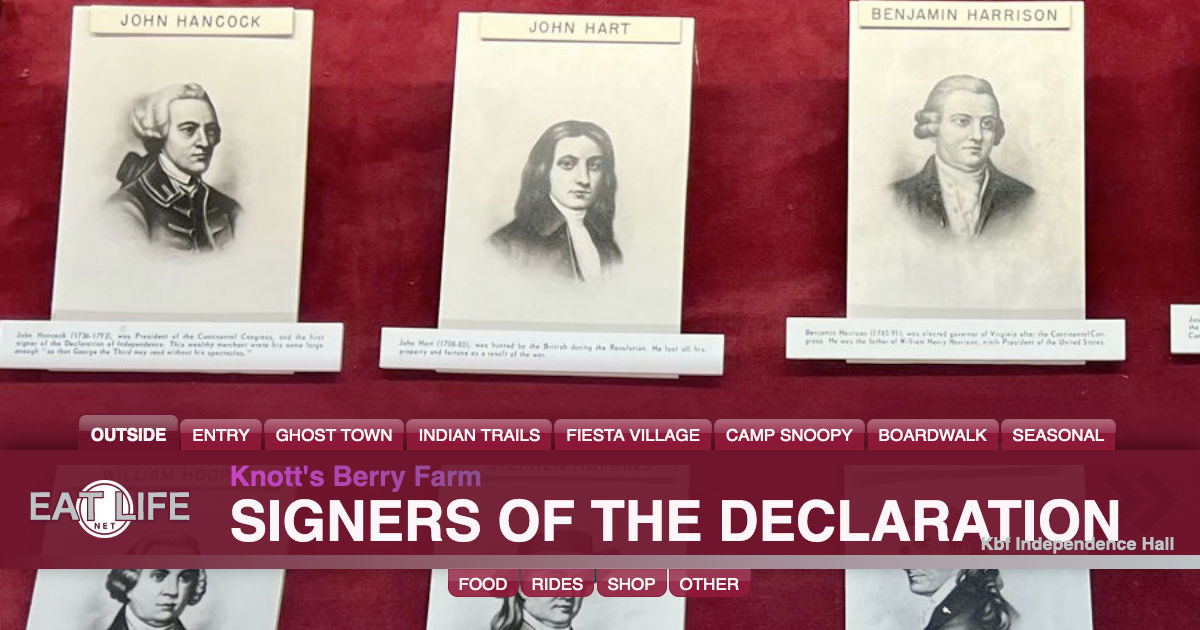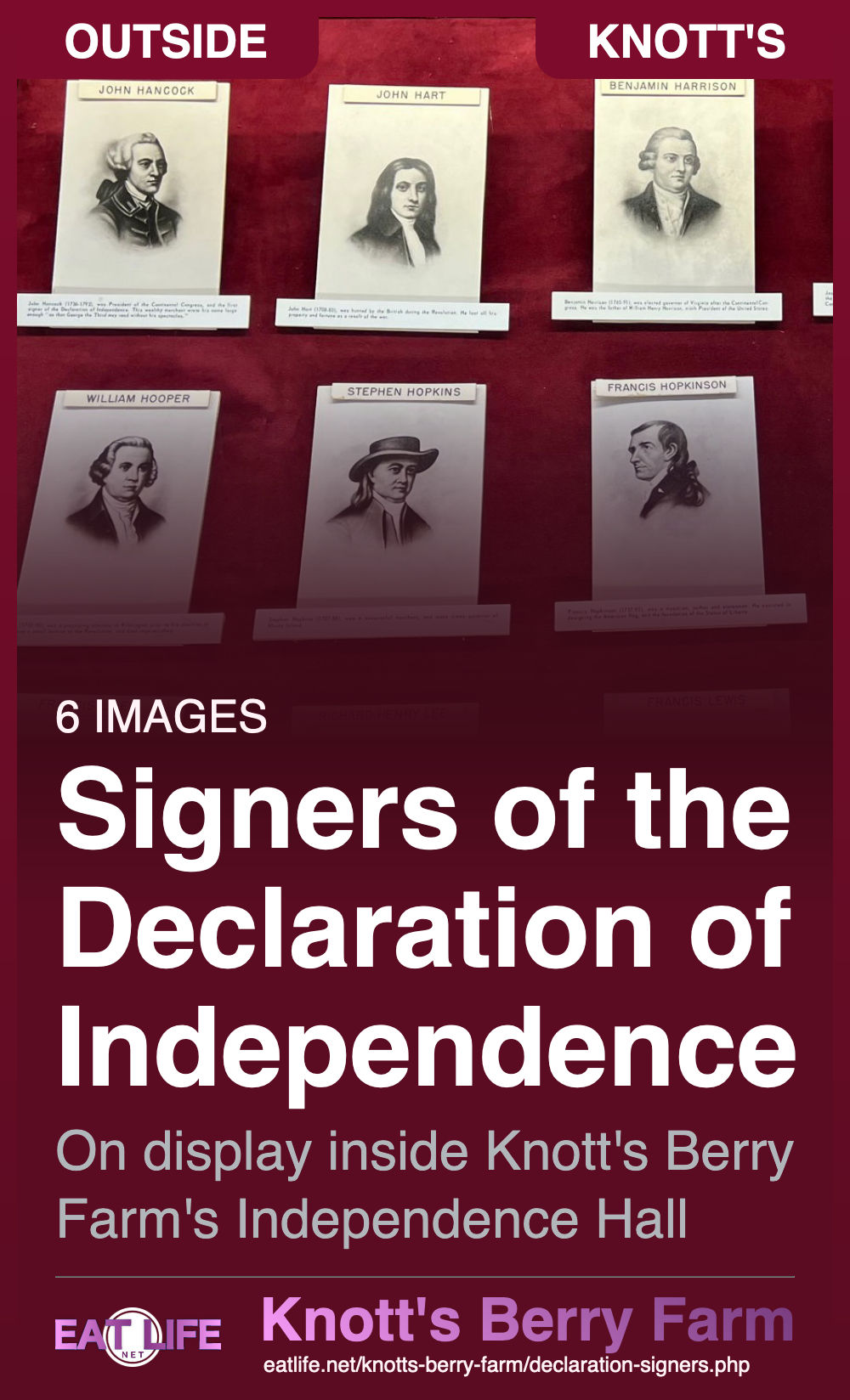Independence Hall Exact Replica
AMAZON FINDSAD
Snoopy T-Shirts Snoopy Stuffed Animals Knott's Raspberry Cookies
As an Amazon Associate we earn from qualifying purchases
Amusement Park Essentials
Snoopy T-Shirts Snoopy Stuffed Animals Knott's Raspberry Cookies
As an Amazon Associate we earn from qualifying purchases
Updated: July 2025
Posted: June 2022
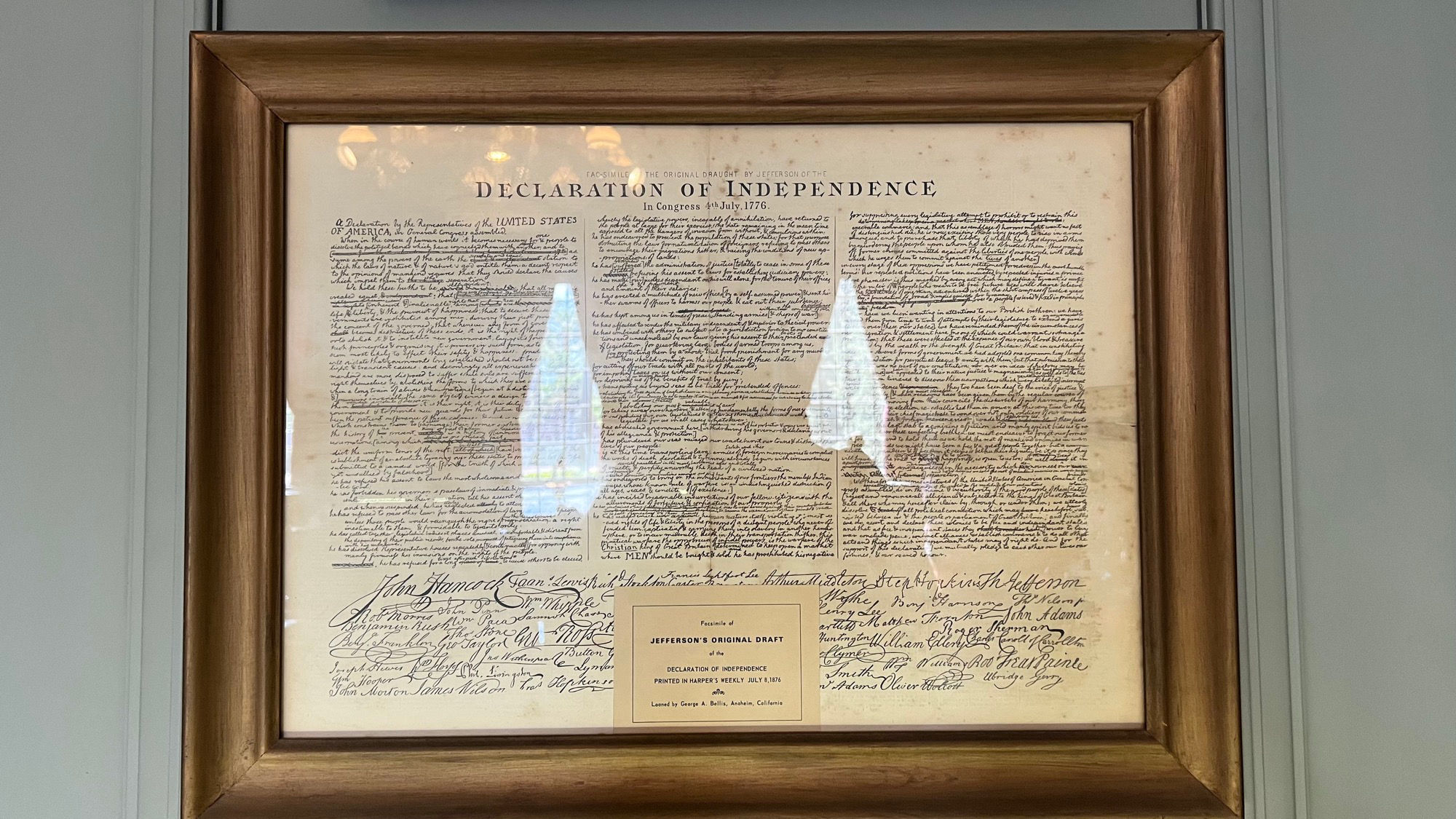
Declaration of Independence
Facsimile of Jefferson's Original Draft of the Declaration of Independence Printed in Harper's Weekly July 8, 1876
Loaned by George A. Bellis, Anaheim, California

- John Adams
John Adams (1735-1826), was the "defender" of the Declaration of Independence during its passage in Congress. He became the second President of the United States. Adams and Jefferson died with hours of one another, exactly fifty years after adaption of the Declaration of Independence. - Samual Adams
Samual Adams (1722-1803), was one of the most influential and zealous patriots at the Continental Congress. Adams was in constant personal financial difficulty throughout his life. In fact, the new suit, shoes, and hat he wore to Congress were furnished by his friends; friends who knew Adams as a man of "honorable poverty." - Josiah Bartlett
Josiah Bartlett (1729-1795), was a practicing medical doctor before the Continental Congress. Subsequently, he served as chief justice and governor of New Hampshire. - Carter Braxton
Carter Braxton (1736-1797), was a man who did not have great faith in democracy, yet he supported his country financially and sustained many personal losses. - Charles Carrol
Charles Carrol (1737-1832), of Carrolton, was the last surviving signer of the Declaration of Independence. Carrol distinguished himself as a US Senator. - Samuel Chase
Samuel Chase (1741-1811), was one of America's foremost Supreme Court Justices. He helped strengthen the foundling judicial branch of government. - Abraham Clark
Abraham Clark (1726-1794), was a gentleman-farmer who served in the Second Continental Congress, and later in the United States Congress. - George Clymer
George Clymer (1739-1813), was a strong advocate for independence from England. At the battle of Brandywine, he and his family narrowly escaped from the British. The Clymer home was sacked and burned before their eyes. - William Ellery
William Ellery (1727-1820), was one who lost property and fortune during the Revolution. He spent the last years of his life as a customs collector at Newport, Rhode Island. - William Floyd
William Floyd (1734-1821), was instrumental in fighting the British to draw during the first invasion of Long Island. His estate was totally destroyed when the British over-whelmed the undermanned militia. - Benjamin Franklin
Benjamin Franklin (1706-1790), was the oldest man to sign the Declaration. This inventor, author and statesman was the most prominent man at the Continental Congress. - Elbridge Gerry
Elbridge Gerry (1744-1814), was a protege of Samuel Adams. He escaped in bedclothes from the British of Lexington. After the Revolution he became governor of Massachusetts and Vice President of the United States under James Madison. Because of his attempt to redistrict Massachusetts along partisan lines, the political term Gerrymander was named after him. - Button Gwinnett
Button Gwinnett (1732-1777), was killed in a duel with General McIntosh shortly after signing the Declaration of Independence. During his lifetime he did very little writing, and consequently his signature is extremely valuable. - Lyman Hall
Lyman Hall (1725-1790), was the leader of the revolutionary cause in Georgia. After the war, he was elected governor of his state.
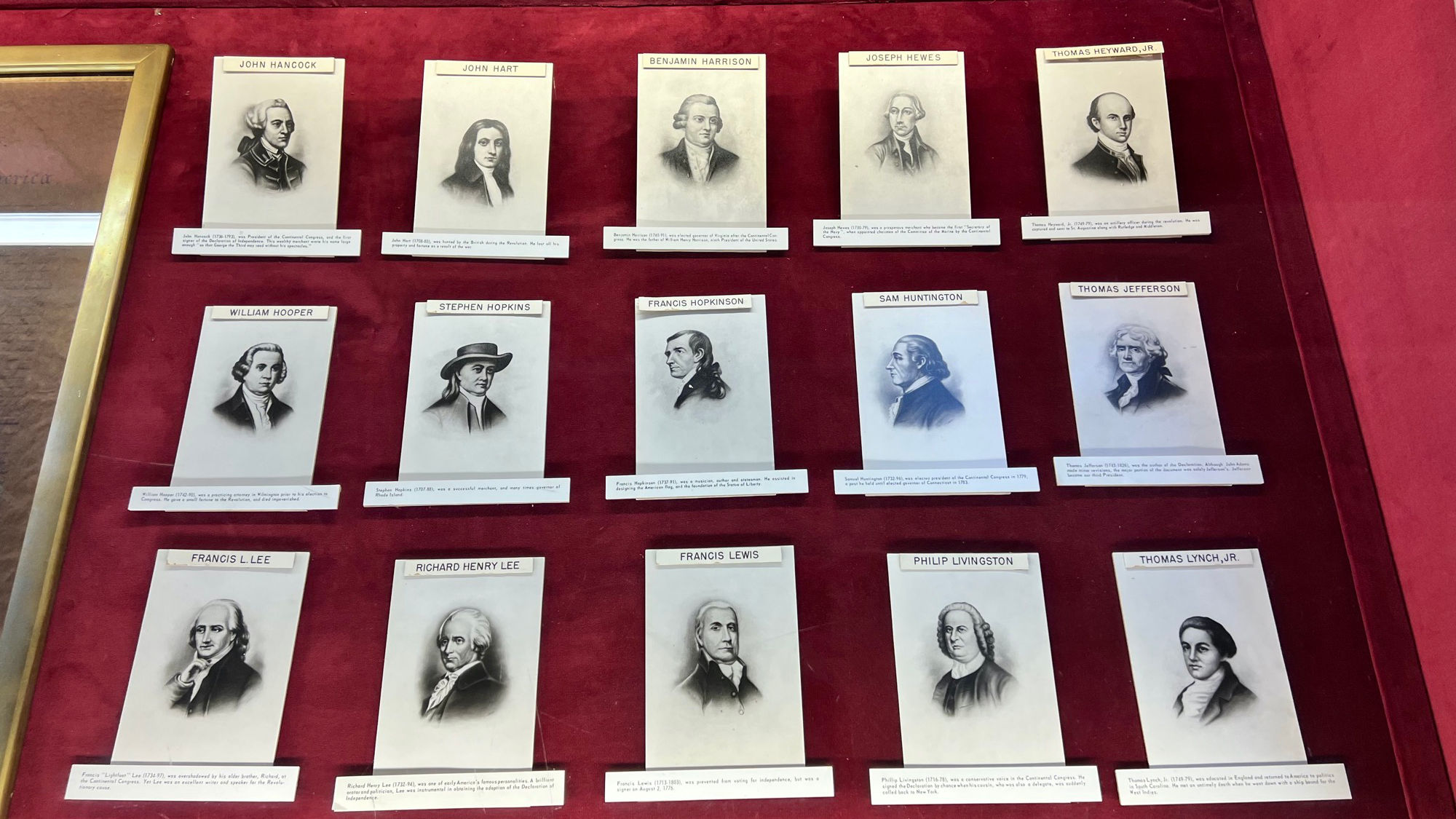
- John Hancock
John Hancock (1736-1793), was President of the Continental Congress, and the first signer of the Declaration of Independence. This wealthy merchant wrote his name large enough "so that George the Third may read without his spectacles." - John Hart
John Hart (1708-1780), was hunted by the British during the Revolution. He lost all his property and fortune as a result of the war. - Benjamin Harrison
Benjamin Harrison (1740-1791), was elected governor of Virginia after the Continental Congress. He was the father of William Henry Harrison, ninth President of the United States. - Joseph Hewes
Joseph Hewes (1730-1779), was a prosperous merchant who became the first "Secretary of the Navy", when appointed chairman of the Committee of the Marine by the Continental Congress. - Thomas Heyward, Jr.
Thomas Heyward Junior (1749-1779), was an artillery officer during the revolution. He was captured and sent to St. Augustine along with Rutledge and Middleton. - William Hooper
William Hooper (1742-1790), was a practicing attorney in Wilmington prior to his election to Congress. He gave a small fortune to the Revolution, and died impoverished. - Steven Hopkins
Steven Hopkins (1707-1788), was a successful merchant, and many times governor of Rhode Island. - Francis Hopkinson
Francis Hopkinson (1737-1791), was a musician, author, and statesman. He assisted in designing the American flag, and the foundation of the Statue of Liberty. - Samuel Huntington
Samuel Huntington (1732-1796), was elected president of the Continental Congress in 1779, a post he held until elected governor of Connecticut in 1783. - Thomas Jefferson
Thomas Jefferson (1743-1826), was the author of the Declaration. Although John Adams mad minor revisions, the major portions of the document was solely Jefferson's. Jefferson became our third President. - Francis "Lightfoot" Lee
Francis Lee (1734-1797), was overshadowed by his older brother, Richard, of the Continental Congress. Yet Lee was an excellent writer and speaker for the Revolutionary cause. - Richard Henry Lee
Richard Henry Lee (1732-1794), was one of early America's famous personalities. A brilliant orator and politician, Lee was instrumental in obtaining the adoption of the Declaration of Independence. - Francis Lewis
Francis Lewis (1713-1803), was prevented from voting for independence, but was a signer on August 2, 1776. - Phillip Livingston
Phillip Livingston (1716-1778), was a conservative voice in the Continental Congress. He signed the Declaration by chance when his cousin, who was also a delegate was suddenly called back to New York. - Thomas Lynch, Jr.
Thomas Lynch Junior (1749-1779), was educated in England and returned to America to politics in South Carolina. He met an untimely death when he went down with a ship bound for the West Indies.
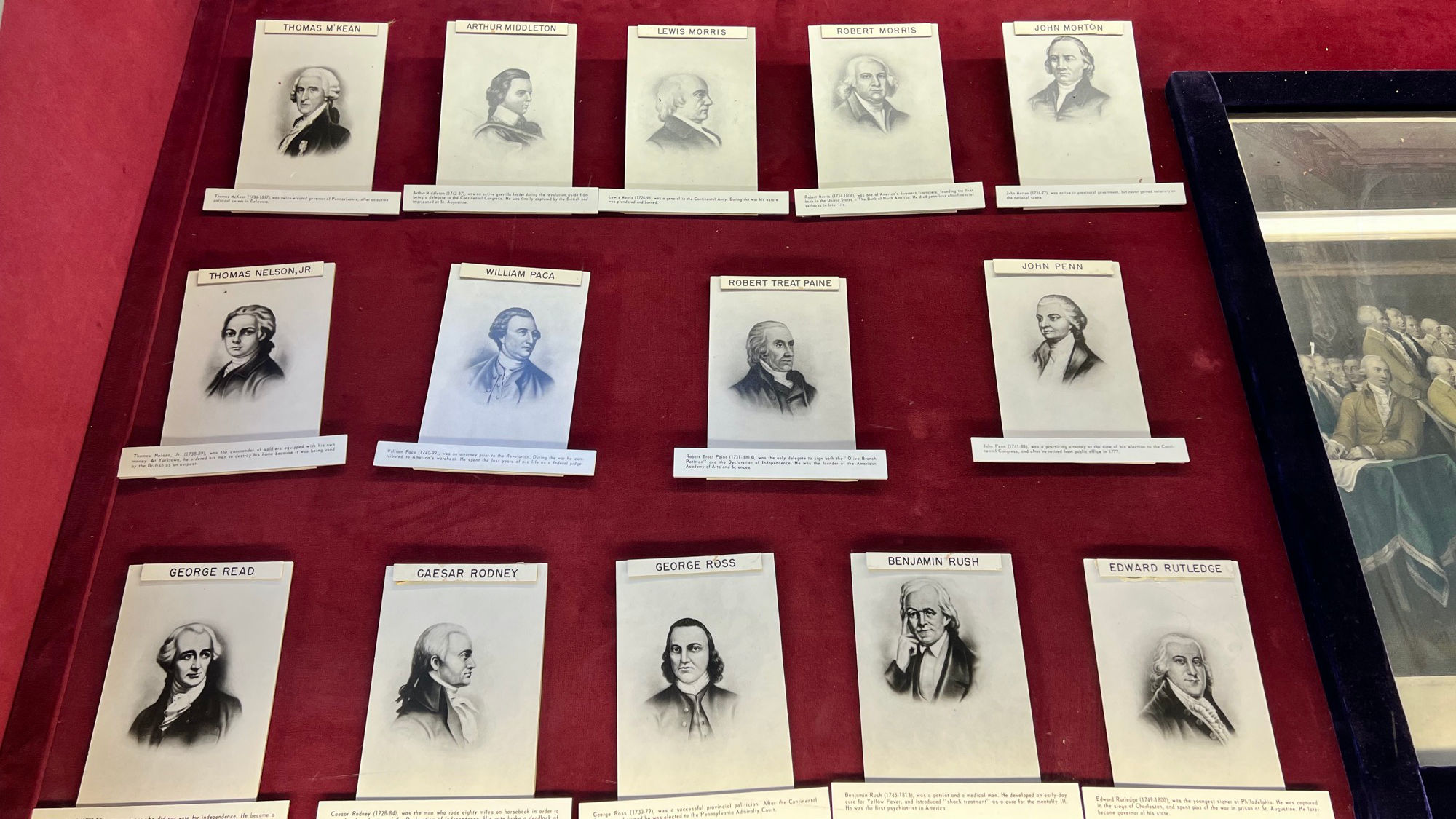
- Thomas McKean
Thomas McKean (1734-1817), was twice-elected governor of Pennsylvania, after an active political career in Delaware. - Arthur Middleton
Arthur Middleton (1742-1787), was an active guerilla leader during the revolution, aside from being a delegate to the Continental Congress. He was finally captured by the British and imprisoned at St. Augustine. - Lewis Morris
Lewis Morris (1726-1798), was a general in the Continental Army. During the war his estate was plundered and burned. - Robert Morris
Robert Morris (1734-1806), was one of America's foremost financiers, founding the first bank in the United States - The Bank of North America. He died penniless after financial setbacks in later life. - John Morton
John Morton (1724-1777), was active in provincial government, but never gained notoriety on the national scene. - Thomas Nelson, Jr.
Thomas Nelson Junior (1738-1789), was the commander of soldiers equipped with his own money. At Yorktown, he ordered his men to destroy his home because it was being used by the British as an outpost. - William Paca
William Paca (1740-1799), was an attorney prior to the Revolution. During the war he contributed to America's war chest. He spent the last years of his life as a federal judge. - Robert Treat Paine
(1731-1813), was the only delegate to sign both the "Olive Branch Petition" and the Declaration of Independence. He was the founder of the American Academy of Arts and Sciences. - John Penn
John Penn (1741-1788), was a practicing attorney at the time of his election to the Continental Congress, and after he retired from public office in 1777. - George Read
George Read (1733-1798), was a politician from Delaware. He was one of only two statesmen who signed four of the great state papers: the original Petition to the King of the Congress of 1774, the Continental Association, the Declaration of Independence, and the Constitution of the United States. - Caesar Rodney
Caesar Rodney (1728-1784), was the man who rode eighty miles on horseback in order to ..to get to Philadelphia to vote in favor of independence. His vote broke a deadlock .. - George Ross
George Ross (1730-1779), was a successful provincial politician. After the Continental Congress .. he was elected to the Pennsylvania Admiralty Court. - Benjamin Rush
Benjamin Rush (1745-1813), was a patriot and a medical man. He developed an early-day cure for Yellow Fever, and introduced "shock treatment" as a cure for the mentally ill. He was the first psychiatrist in America. - Edward Rutledge
Edward Rutledge (1749-1800), was the youngest signer at Philadelphia. He was captured in the siege of Charleston, and spent part of the war in prison at St. Augustine. He later became governor of his state.
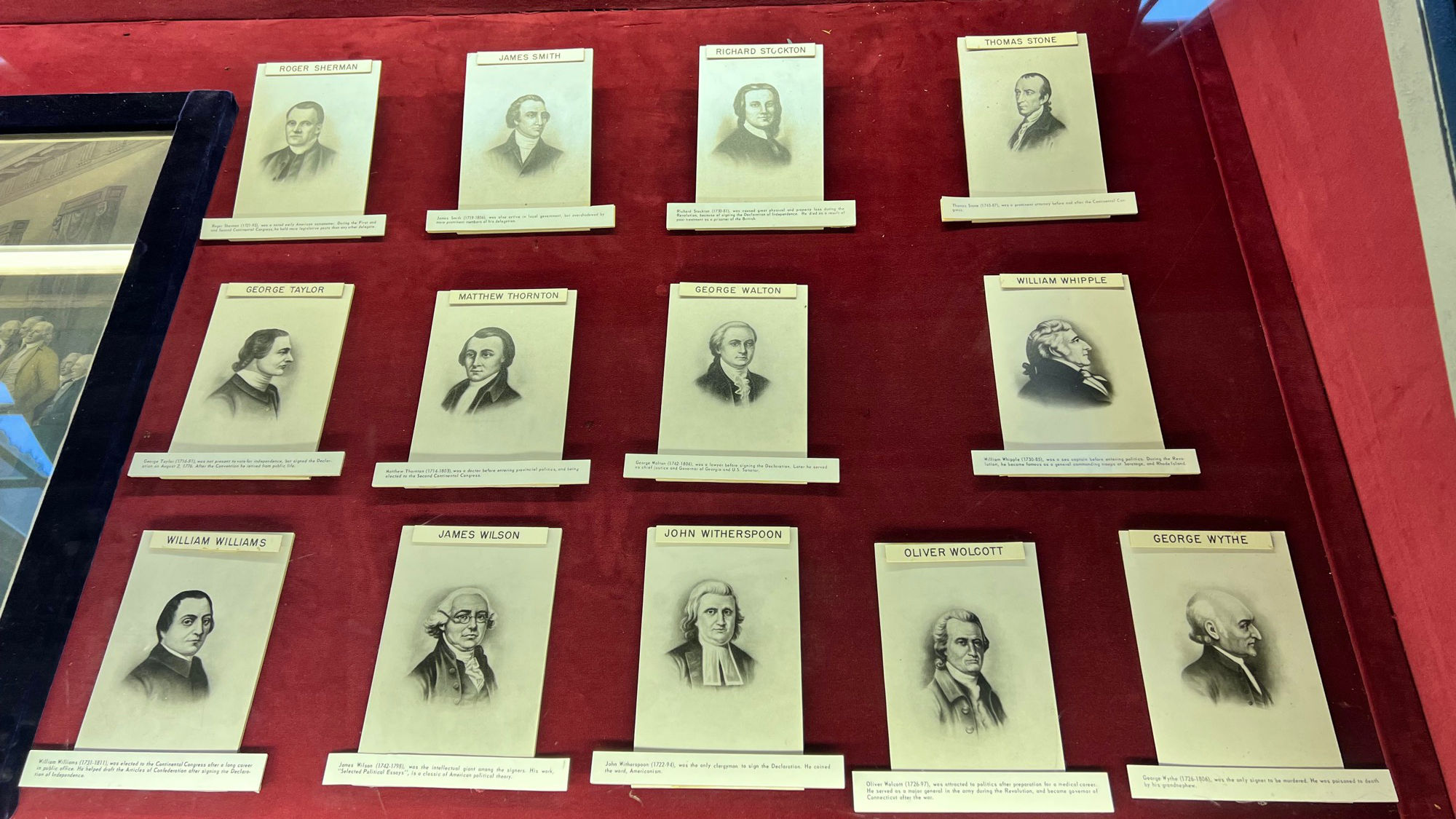
- Roger Sherman
Roger Sherman (1721-1793), was a noted early American astronomer. During the First and Second Continental Congress, he held more legislative posts than any other delegate. - James Smith
James Smith (1719-1806), was also active in local government, but overshadowed by more prominent members of his delegation. - Richard Stockton
Richard Stockton (1730-1781), was caused great physical and property loss during the Revolution, because of signing the Declaration of Independence. He died as a result of poor treatment as a prisoner of the British. - Thomas Stone
Thomas Stone (1743-1787), was a prominent attorney before and after the Continental Congress. - George Taylor
George Taylor (1716-1781), was not present to vote for independence, but signed the Declaration on August 2, 1776. After the Convention he retired from public life. - Matthew Thornton
Matthew Thornton (1714-1803), was a doctor before entering provincial politics, and being elected to the Second Continental Congress. - George Walton
George Walton (1742-1804), was a lawyer before signing the Declaration. Later he served as chief justice and Governor of Georgia and US Senator. - William Whipple
William Whipple (1730-1785), was a sea captain before entering politics. During the Revolution, he became famous as a general commanding troops at Saratoga, and Rhode Island. - William Williams
William Williams (1731-1811), was elected to the Continental Congress after a long career in public office. He helped draft the Articles of Confederation after signing the Declaration of Independence. - James Wilson
James Wilson (1742-1798), was the intellectual giant among the signers. His work, "Selected Political Essays", is a classic of American political theory. - John Witherspoon
John Witherspoon (1722-1794), was the only clergymen to sign the Declaration. He coined the word, Americanism. - Oliver Wolcott
Oliver Wolcott (1726-1797), was attracted to politics after preparation for a medical career. He served as a major general in the army during the Revolution, and became governor of Connecticut after the war. - George Wythe
George Wythe (1726-1806), was the only signer to be murdered. He was poisoned to death by his grandnephew.
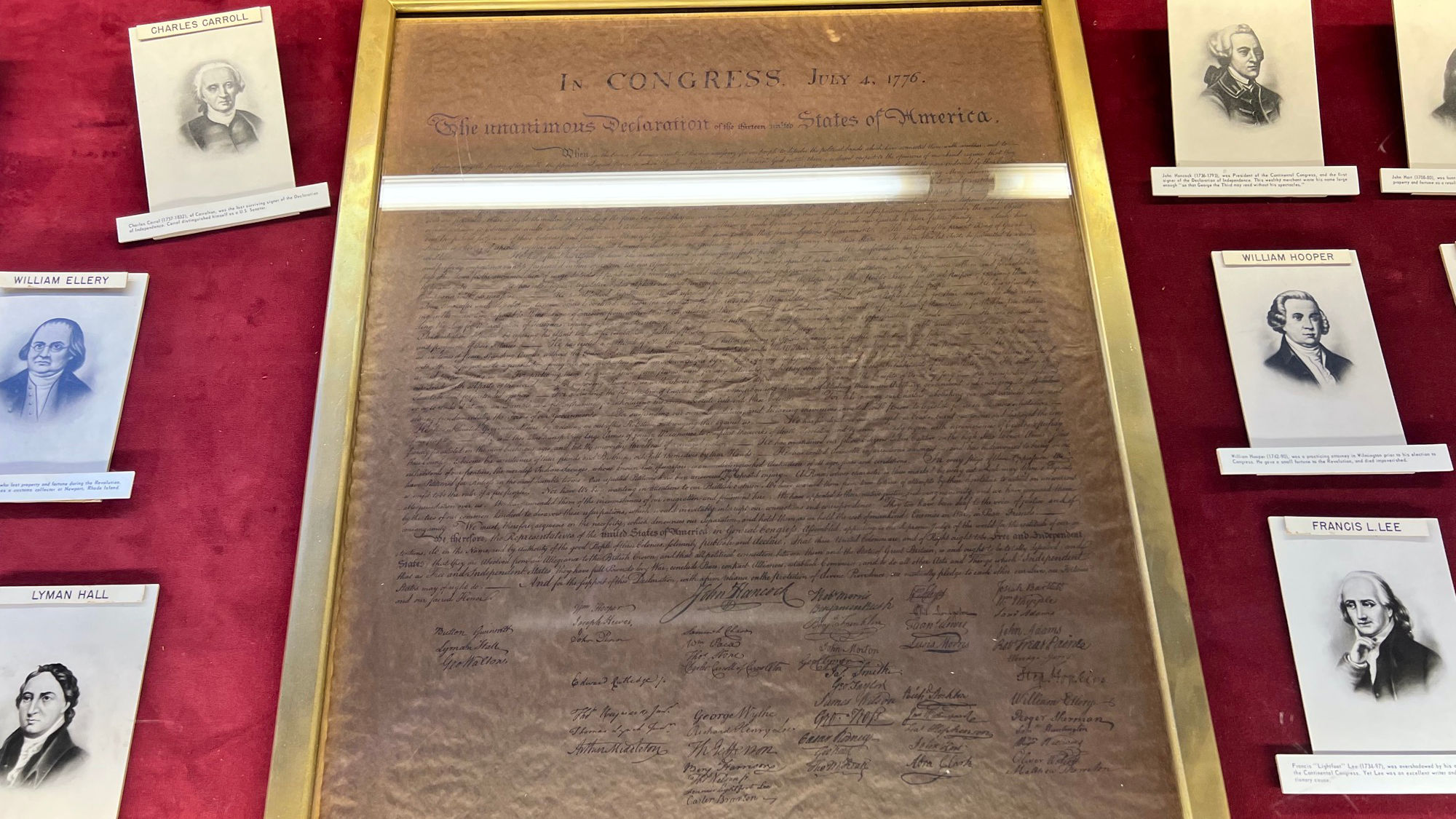
The unanimous Declaration of the thirteen united States of America






